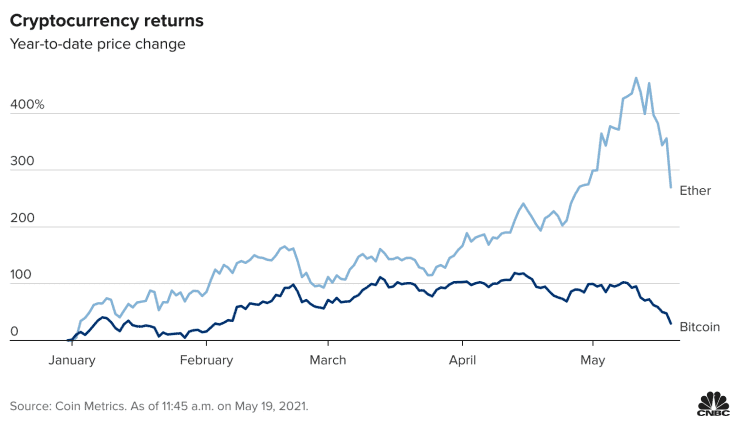“If the future lies in blockchain transactions — and ether is going to be a better lubricant of those blockchain transactions — you could actually argue that ether has a stronger upside story than bitcoin does,” Damodaran, a professor of finance at NYU’s Stern School of Business, told CNBC’s “Street Signs Asia” on Thursday.
Ether is the cryptocurrency that runs on the Ethereum blockchain. It currently sits in second place behind bitcoin in terms of market cap, according to Coinmarketcap. Noted proponents of Ethereum include billionaire investor Mark Cuban, who told CNBC previously that it “dwarfs” bitcoin.
Damodaran, a longtime skeptic of the cryptocurrency, said bitcoin lacks an “endgame” and called it a “purely speculative game.”
“All that bitcoin bulls seem to talk about, their biggest sales pitch for bitcoin is: ‘Look at how much money I’ve made on bitcoin.’ That’s it, that’s the end of the sales pitch,” he said. “That’s not a sales pitch. That tells me nothing about the substance here.”

“I wouldn’t be surprised if bitcoin is up 20% tomorrow, down 25% the day after. This has become a purely speculative game,” said Damodaran, who is also known as Wall Street’s “dean of valuation.”
The professor’s comments came after a collapse in cryptocurrency prices Wednesday stateside.
Bitcoin plummeted 30% to about $30,000 at one point, but has since recovered partially and was trading at $40,110.38 as of 3:51 a.m. ET Thursday, according to Coin Metrics. Ether was not spared in the fallout, briefly falling below $2,000 before later making a partial recovery. It last traded at $2,724.61.
That wild ride was likely triggered by a slew of negative headlines and catalysts, such as tweets by Tesla CEO Elon Musk as well as regulation by the Chinese government.
Diverse cryptocurrency space
Damodaran also argued there is a need for a separation in how each cryptocurrency is treated, given that their intended purposes vary.
“I think we need to start to separate the crypto space into: those cryptos that are trying to be currencies, those cryptos that are trying to be collectibles — millennial gold — and those cryptos that are actually commodities,” Damodaran said. “Right now … we bundle them altogether in this once space.”
The cryptocurrency sector today spans a wide gamut, from bitcoin which is often pitched as a potential competitor to gold as a store of value, to others such as Dogecoin — originally started as a joke. Both cryptocurrencies have seen wild swings in their price so far this year due in part to their association with Elon Musk.
Meanwhile, crypto collectibles known as NFTs also grabbed headlines earlier this year after people started paying millions for them.